新概念英语2第50课课件
合集下载
新概念英语第二册50课课件
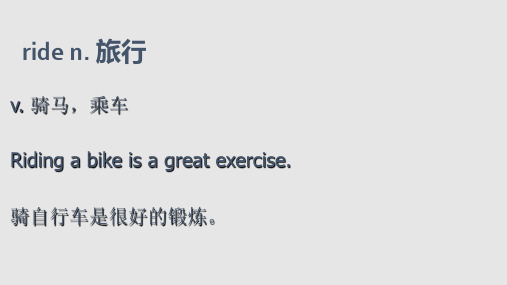
谢谢您的观看!
the top of the mountain. 5.The bus can carry fifty_____(乘客).
expect realize shock passenger
v.期待,预料 vt. 认识到,实现,了解 n.震惊 n.乘客
1.love/like doing sth.喜爱/喜欢做某事 2.travel in the country 在乡间旅行 3.lose one's way=get lost 迷路 4.go on an excursion 做一次短距离的旅行 5.take sb. some time花费某人多少时间 6.longer than I expected 比我预期的时间要长 expect v.
He has an excursion into science.
conductor n. 售票员 conduct v. 组织,安排,实施,执行,指挥,传导 conductor n.指挥家 导体 列车员
conductress n.女售票员 passenger n. 旅客;乘客 conduction n. 传导
11.forget to do 忘了做某事 forget doing忘了做过某事
12.put sb. off 让...下车 13.in that case 要是那样的话,既然如此 14.prefer to do sth. 宁可做某事 15.stay on the bus 留在车上
摘要写作: 1.Woodford Green. The conductor promised to tell him where to get off. 2.Yes,they did. The writer asked if they were at Woodford Greeen.
新概念2 第50课 课件
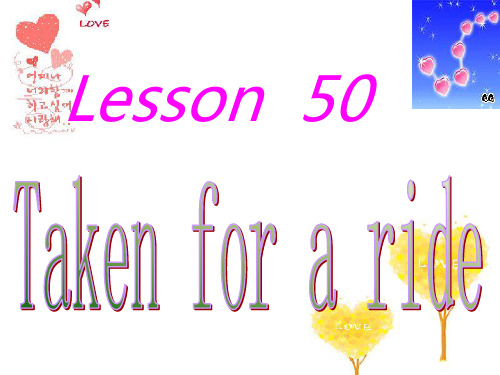
excursion n.远足 recently adv.最近 expect v.期盼 Woodford Green 伍德福德草地 conductor n.售票员 view n.景色 realize v.意识到 shock n.震惊
excursion n. 远足,旅行(集体)
• • • • an excursion train 游览列车 an excursion ticket 旅游特惠票 excursion into sth . 涉足,涉猎 He has an excursion into science.
③country
⒈ 国家(cn)
2.农村(un)
countryside 乡村,暗念偏僻之意
从政治角度来讲:
rural area 农村 suburban area郊区 urban area市区
• Expect, Wait for
• expect可以表示“预计……可能发生(或来到),等待, 期盼”,它表示等待时往往侧重人的心理而不是具体在 某个地方等。 • I expect / I’m expecting to hear from you. • I’m expecting the bus to arrive in the next ten minutes. • My trip took me longer than I expected.
journey,tour,travel,trip,voyage, excursion,expedition
• journey最普通用词,侧重指时间较长、距离较远的单程 陆上,水上或空中的旅行。重点在距离 • tour指最后返回出发地,旅途中有停留游览点,距离可长 可短,目的各异的周游或巡行。 • travel泛指旅行的行为而不指某次具体的旅行,多指到远 方作长期旅行,不强调直接目的地,单、复数均可用。 • trip普通用词,口语多用,常指为公务或游玩作的较短暂 的旅行。 • voyage指在水上旅行,尤指海上旅行,也可指空中旅行。 • excursion较正式用词,常指不超过一天的短时期娱乐性 游玩,也可指乘火车或轮船往返特定景点的远足旅游。 • expedition指有特定目的远征或探险。
新概念英语第二册第50课-Taken-for-a-ride-乘车兜风PPT幻灯片
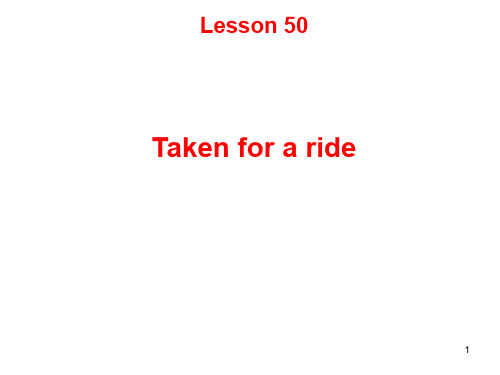
• review v. 复习 • preview v. 预习 • interview v. 面试 • overview n. 概述
5
5. lose v. (lost lost )
• lose sb. way • lose a game/war • get lost • {类}loose adj.松散的
10
distance
• a. c.n.&u.n. 距离;间距 e.g. A good cyclist can cover distances of over a
hundred miles a day. 自行车骑得好的人一天可以行驶一百多英里.
• b. c.n.&u.n 远方;远处 e.g. At a distance of six miles you can’t see much. 距离六英里以外的东西很难看清。
What a ride!
• . vt.&vi. (ride, rode, ridden) He jumped on his horse and rode away. Can you ride a horse? 注: ride 用于骑马、骑自行车时,常用作
vt., 即ride a horse; ride a bike; • 用于乘公共汽车时、乘火车时,常用作or a ride • take…for… 把……当作…… • taken for a ride 就当作是一次兜风 • take sb. for a ride 欺骗 • taken for 上当了
8
• 用作名词: go for a ride in a car 乘车出去兜风。 Can I have /take a ride on your bike?
Lesson 50
5
5. lose v. (lost lost )
• lose sb. way • lose a game/war • get lost • {类}loose adj.松散的
10
distance
• a. c.n.&u.n. 距离;间距 e.g. A good cyclist can cover distances of over a
hundred miles a day. 自行车骑得好的人一天可以行驶一百多英里.
• b. c.n.&u.n 远方;远处 e.g. At a distance of six miles you can’t see much. 距离六英里以外的东西很难看清。
What a ride!
• . vt.&vi. (ride, rode, ridden) He jumped on his horse and rode away. Can you ride a horse? 注: ride 用于骑马、骑自行车时,常用作
vt., 即ride a horse; ride a bike; • 用于乘公共汽车时、乘火车时,常用作or a ride • take…for… 把……当作…… • taken for a ride 就当作是一次兜风 • take sb. for a ride 欺骗 • taken for 上当了
8
• 用作名词: go for a ride in a car 乘车出去兜风。 Can I have /take a ride on your bike?
Lesson 50
新概念英语第二册Lesson50(共28张PPT)
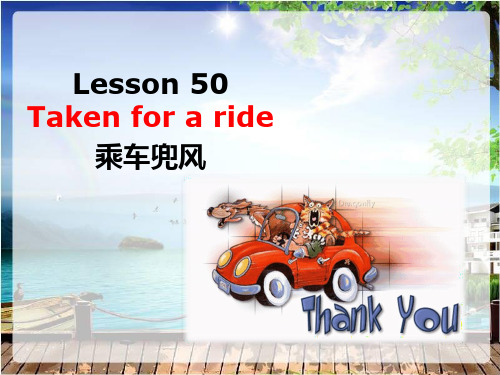
forget to do sth. 忘记去做某事 forget doing sth. 忘记做过某事
• forget to do忘记去做某事 • forget doing忘记已经做了什么事 • I forget to shut the door. 我忘了锁门 • I forget shutting the door. 我忘了门已经锁了 •
as far as= so far as (表示范围)远至某处
否定句用 so/as far as
This is not so far as we go.
• This is as far as I can do.
• as far as + 从句; 最大程度地, 最大限度地
• as far as we go=we couldn't go any more
in that case = if that happens 若是那样的话
prefer to do sth. 宁可做某事
prefer A to B.
比起B,更喜欢A
prefer doing A to doing 比起做事件A,更喜欢 做事件B
Thanks for your attention!
Notes on the text
Language points
I love travelling in the country, but I don't like losing my way.
love/like/enjoy doing sth.
country=countryside=rural area 乡间 city=urban area 城市 lose one’s way =get lost 迷路 lose one’s job 丢掉工作 lose one’s temper 发脾气 lose weight 减肥
• forget to do忘记去做某事 • forget doing忘记已经做了什么事 • I forget to shut the door. 我忘了锁门 • I forget shutting the door. 我忘了门已经锁了 •
as far as= so far as (表示范围)远至某处
否定句用 so/as far as
This is not so far as we go.
• This is as far as I can do.
• as far as + 从句; 最大程度地, 最大限度地
• as far as we go=we couldn't go any more
in that case = if that happens 若是那样的话
prefer to do sth. 宁可做某事
prefer A to B.
比起B,更喜欢A
prefer doing A to doing 比起做事件A,更喜欢 做事件B
Thanks for your attention!
Notes on the text
Language points
I love travelling in the country, but I don't like losing my way.
love/like/enjoy doing sth.
country=countryside=rural area 乡间 city=urban area 城市 lose one’s way =get lost 迷路 lose one’s job 丢掉工作 lose one’s temper 发脾气 lose weight 减肥
新概念英语第二册50课PPT课件
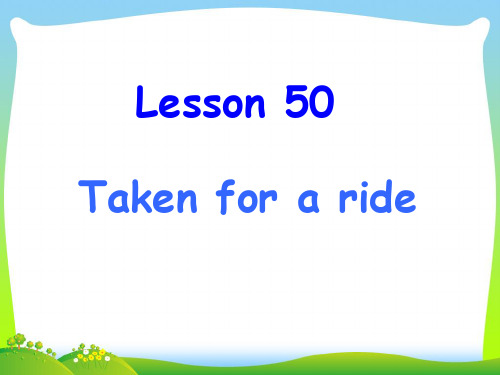
3.What did the writer realize when the bus stopped?
4.Why did the writer not get off the bus at woodford Green?
A: Woodford Green.
No, he didn't.
A: The conductor promised to tell him where
lose one's job lose one's temper lose weight / put on weight lose one's cool 怒不可遏 lose one's face lose one's head 昏头了,冲动 lose one's life 遇害,丧生 lose one's breath 上气不接下气
to get off.
A: The writer realized the conductor had
forgotten to put him off.
A: Because the bus would go back and pass
Woodford Green.
Language Points:
1. Taken for a ride
3. miss v. 想念,错过 eg: We must hurry or we'll miss the train. I miss you very much.
lost missing gone
﹡lost 表示“丢失”,含有失去后难以找回的意味 ,在句中可作定语,表语和补语。 eg: The parents found the lost child at last. His elder brother was lost at sea.
新概念二 Lesson50 课件

Discussion
trip travel journey voyage flight tour 的区别
1. journey指从一地到另一地,通常指陆地上的远距离“旅行”,有时也可以表示经常走的或长 或短的“路程”。只作名词。例如: I took a journey from Beijing to Shanghai last year. -How long is your journey to school? --Only about 10 minutes. 2. voyage主要指远距离的水上旅行,也可以指空中旅行意思为“航海、航空、航行”等。只作 名词。例如: She usually gets seasick during the voyage. 3. trip 一般指时间短、距离近的“旅行、远足”,也可以指长途旅行。在非正式用语中可代替 journey。只作名词。例如: I will be on a trip to / journey to the south next summer holiday. 4. tour 着重指旅行线路比较曲折,常表示“(周游各地的)参观、访问、(巡回)旅游、视察、 购物、演出”等意思。可作动词和名词。例如: I will tour the world in the future. / My father has gone down-town on a shopping tour. 5. travel作“旅行、游历”解,一般表示从一地到另一地旅行这一总的概念。常指长时间、远 距离的“旅行”。尤指出国旅行。可作动词和名词。其复数形式意思为“旅游笔记”、“游 记”。例如: At present, many people are fond of travel in their spare time. 6. flight 主要指空中飞行
新概念英语第2册课件Lesson50(共50页)
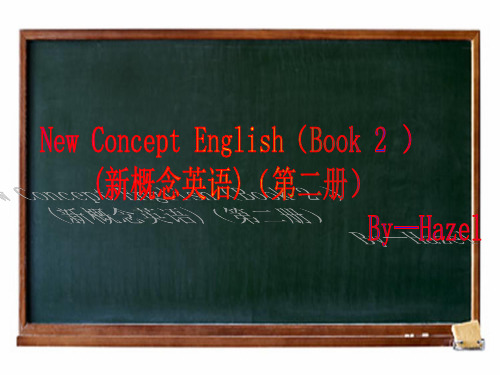
New words and
expressions
• ★excursion n 远足 •excursion n 游玩, 郊游(距离不会很远) •weekend's excursion 周末游 •Tomorrow we will have (a day's excursion 一日游)
•
excursion n. 远足,旅行(集体)
• an excursion train • an excursion ticket • excursion into sth .
游览列车 旅游特惠票 涉足,涉猎
• He has an excursion into science.
• ★conductor n 售票员 (在火车上称为列车员) • ★view n 景色
• Lesson 50 Taken for a ride 乘车兜风
【Text】 • I love travelling in the country, but I don't like losing
my way. • I went on an excursion [iksˈkə:ʃən] recently, but my
• conductress 女售票员 • conduct v. 组织,安排,实施,执
行,指挥,传导 • conduction n . 传导
view n. 景色,尤其自然美景;观点 • a view of … 一个……美景
view about /on sth. 关于……的观点 in one’s view 依某人看 in one’s opinion 在某人看 in view of 鉴于
新概念二 Lesson 50
Taken for a ride 乘车兜风
新概念英语第2册课件Lesson50(共40页)
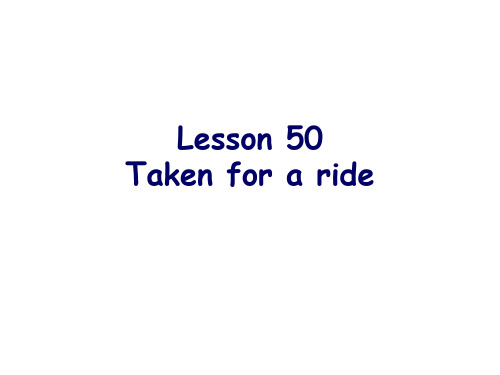
Lesson 50 Taken for a ride
Warming up
Work in pairs. Do this quiz and find out how much you know about the United Kingdom.
1. Can you name the major tourist areas of Xiamen
First let's watch the vedio and try to figure out the question?
Why did the writer not get off the bus at the Woodford Green?
Text Understanding
language points
1. I love travelling in the country, but I don't like losing my way.
➢ love/like doing sth 喜欢做某事 (强调一种习惯) eg. I love having dinner with you, but I don't like
2) v. 骑,乘(马,自行车,汽车等) eg. ride a pony, bicycle
New words and expressions
exursion n. 远足,短途旅行
trip
eg. weekend excursion /trip
a day excursion/trip
shopping excursion/trip
• conduct 1) n. 行为,品行,举止 eg. a man of good conduct
shameful conduct A Code of Conduct for Students
Warming up
Work in pairs. Do this quiz and find out how much you know about the United Kingdom.
1. Can you name the major tourist areas of Xiamen
First let's watch the vedio and try to figure out the question?
Why did the writer not get off the bus at the Woodford Green?
Text Understanding
language points
1. I love travelling in the country, but I don't like losing my way.
➢ love/like doing sth 喜欢做某事 (强调一种习惯) eg. I love having dinner with you, but I don't like
2) v. 骑,乘(马,自行车,汽车等) eg. ride a pony, bicycle
New words and expressions
exursion n. 远足,短途旅行
trip
eg. weekend excursion /trip
a day excursion/trip
shopping excursion/trip
• conduct 1) n. 行为,品行,举止 eg. a man of good conduct
shameful conduct A Code of Conduct for Students
新概念第二册Lesson50课件
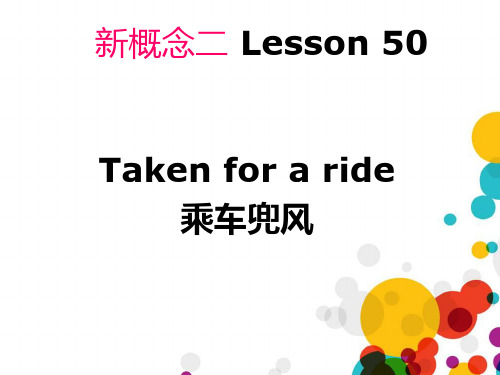
• I don’t know how people can solve the pollution problems.
• =I don’t know how to solve the pollution problems.
• Please tell us where we can buy hand-made shoes.
• Lesson 50 Taken for a ride 乘车兜风
【Text】 • I love travelling in the country, but I don't like losing
my way. • I went on an excursion [iksˈkə:ʃən] recently, but my
新概de 乘车兜风
On foot
horse
carriage
bike
motorbike
car
• CRH train • China Railways High-speed
New York
London
Woodford Green
Watch and answer
• I sat in the front of the bus to get a good view of the countryside.
• After some time, the bus stopped. Looking round, I realized with a shock that I was the only passenger left on the bus.
1 Where does the writer love travelling? 2 Where did he want to go on his recent excursion? 3 What did the writer realize when the bus stopped? 4 Why didn’t the writer get off at woodford Green?
英语新概念2Lesson50-Rewardforvirtue教学课件

Vocabulary
guiltily ['giltili] adv.内疚地
【词组】 guiltily conscience 问心有愧 clear conscience 问心无愧 【例句】 He glanced guiltily over his shoulder. 他内疚地向后瞥了一眼。
Vocabulary
First of all, he wrote out a long list of all the foods which were forbidden.
first of all,为固定短语,表示“首先”、“第一”。 在表达个人的观点时候可以用以下几组短语: first of all/in addition/moreover/finally to begin with/besides/what's more/last but not the least
He began his diet a week ago. First of all, he wrote out a long list of all the foods which were forbidden.
他是一星期前开始节食的。首先,他开列了一张长长的单子,上面列了所有禁吃的食物。
第一句是主谓宾状结构,主语He,谓语是began,宾语是his diet,状语是a week ago. 第二句是定语从句,主句是主谓宾状结构,主语he,谓语动词wrote out,宾语是a long list of all the定语从句,主系表结构,被动语态,主语which,谓语动词是were,表 语是过去分词forbidden.
【拓展】 go on a diet be on a diet 节食 【例句】 She's on a very strict diet. 她正严格节食。
新概念英语第二册lesson50(共24张PPT)
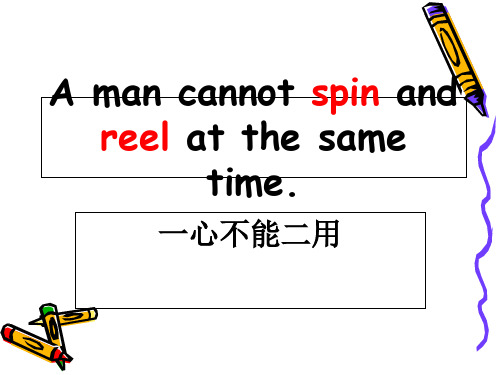
Article focuses
1. I love travelling in the country, but I don't like losing my way.
a. love/like to do sth love/like doing sth
b. in the country=in the countryside 在乡下 c. lose one’s way 迷路
2. We can see a fine __vi_e_w__ of the village from the top of the mountain.(景色)
3. We had to _g_e_t_o_f_f_ the bus because its engine had gone wrong. (下车)
比起…更喜欢…,喜欢…而不喜欢…
prefer doing …to doing… 比起做…更喜欢做…
prefer to do … rather than do … 宁愿做…而不愿做…
eg: ·I prefer English to math.
·He prefers riding a bike to driving.
'Oh dear,' said he conductor suddenly.
'I forgot to put you off. '
a. forget to do sth
忘了去做某事
forget doing sth
忘了做过某事
remember to do sth 记得去做某事
remember doing sth 记得做了某事
a. in that case 如果那样的话 in this case 在这种情况 in any case 不管怎么样
新概念英语第二册50课PPT课件

第九页,共32页。
★conduct
(1)n. 行为;品行;举止
a man of good conduct 品行端正的人
the rule of conduct 行为准则
honorable conduct 光荣的行为 shameful conduct 可耻的行为
(2)v. 指导;引导 eg:●He conducted me around the
eg: They often spend much money on books.
• cost 主语是“事”或者“物”,宾语是钱
eg: This coat costs me 100 yuan.
• pay 主语是人,宾语是钱
短语:pay for
eg: He paid $ 6 for the book.
● a day's excursion 一日游 ● They are going to have a day's
excursion next Saturday.
第四页,共32页。
辨析:
• 1. journey指从一地到另一地,通常指陆地上的远 距离“旅行”,有时也可以表示经常走的或长或短 的“路程”。只作名词。
museum. ●The young man conducted the tour.
第十页,共32页。
★view
(1)n. 景色
eg:The view of the top of hill is wonderful.
★ 辨析: ● view 常指从远处或高处看到的 ● landscape (陆地的)景观,景象 ● scene 可数 (view as seen by a spector) ● scenery 不可数(general natural features of
★conduct
(1)n. 行为;品行;举止
a man of good conduct 品行端正的人
the rule of conduct 行为准则
honorable conduct 光荣的行为 shameful conduct 可耻的行为
(2)v. 指导;引导 eg:●He conducted me around the
eg: They often spend much money on books.
• cost 主语是“事”或者“物”,宾语是钱
eg: This coat costs me 100 yuan.
• pay 主语是人,宾语是钱
短语:pay for
eg: He paid $ 6 for the book.
● a day's excursion 一日游 ● They are going to have a day's
excursion next Saturday.
第四页,共32页。
辨析:
• 1. journey指从一地到另一地,通常指陆地上的远 距离“旅行”,有时也可以表示经常走的或长或短 的“路程”。只作名词。
museum. ●The young man conducted the tour.
第十页,共32页。
★view
(1)n. 景色
eg:The view of the top of hill is wonderful.
★ 辨析: ● view 常指从远处或高处看到的 ● landscape (陆地的)景观,景象 ● scene 可数 (view as seen by a spector) ● scenery 不可数(general natural features of
新概念英语2第50课课件

(2)in that/this case表示‚既然是这/那样‛、‚假使那/这样 的话‛: Is he one of your best friends? In that/this case, you may invite him. 他是你最好的朋友之一吗?既然如此,你可以邀请 他。 (3)prefer 常与would连用。 a)prefer sth to sth 表示 ‚宁要…而不要‛,to是介词: Which would you prefer, tea or coffee? 你喜欢哪一样,茶还是咖啡? b) prefer to do sth & prefer doing sth 见前 (love to do sth & love doing sth) c)prefer to do sth rather than do sth 表示 ‚宁愿干…不愿干‛: She would prefer to come with you rather than stay there. 她宁 愿跟你走也不愿呆在那里。
(1)love to do sth & love doing sth love 后面用不定式作宾语的 话,也就是love to do sth 是指特定或具体某次行为;用动名语作宾 语,表示一般倾向或习惯性动作。还有一些词如like, hate,prefer, can’t bear 等也是如此。
例:I like swimming of course, but I don’t like to swim today because I don’t feel well. 我当然喜欢游泳,但今天我不想去因为 我觉得不舒服。
Lesson 50
Taken for a ride
新概念英语第二册第50课-Taken-for-a-ride-乘车兜风PPT幻灯片

sometime (过去或将来的)某一时刻 eg. I hope to go to Beijing sometime soon.
sometimes 有时 eg. Sometimes I work in the day and sometimes at night.
some times 好几次
21
eg. My uncle has been to London some times
countrycountrysideruralareacountrycountrysideruralarea乡间乡间cityurbanareacityurbanarea城市城市loseoneswaygetlostloseoneswaygetlost迷路迷路loseonesjobloseonesjob丢掉工作丢掉工作loseonestemperloseonestemper发脾气发脾气loseweightloseweight减肥减肥14excursionrecentlyexcursionrecentlymytriptookmelongerthanexpectedmytriptookmelongerthanexcursiongoexcursionhaveexcursionexcursion作一次短距离的旅行作一次短距离的旅行15进行为某一目的而去进行为某一目的而去i?llgoholidaynextmonth
16
• sb. spend some time (in) doing sth. I spent a month learning English. • sb. spend some time on sth. 金钱上的花费cost, pay for sth. • than I expected 比我所预料的(口 语) You are more beautiful than I expected. • than I thought 比我原以为的 The English class took me longer than I thought.
- 1、下载文档前请自行甄别文档内容的完整性,平台不提供额外的编辑、内容补充、找答案等附加服务。
- 2、"仅部分预览"的文档,不可在线预览部分如存在完整性等问题,可反馈申请退款(可完整预览的文档不适用该条件!)。
- 3、如文档侵犯您的权益,请联系客服反馈,我们会尽快为您处理(人工客服工作时间:9:00-18:30)。
4、‘I'll tell you where to get off,’ Answered the conductor. ‚我会告诉您在哪儿下车,‛ 售票员回答说。
ห้องสมุดไป่ตู้
☆where to get off 作tell的直接宾语。
☆tell sb where to get off 是个习语,非正式地表示 ‚教训某人行为 规矩点或识相点‛
6. After some time, the bus stopped. Looking around, I realized with a shock that I was the only passenger left on the bus. 过了一些时候,车停了。我环视了一下四周,惊奇地发现车里就只剩 我一个乘客了。 ☆looking around 是现在分词短语,作时间状语。
(2)lose one’s way 迷路 [特殊难点] lose, loose, miss ①lose表示 ‚失去,丢失‛,其名词形式为loss lose one’s sight (失明) ; lose one’s memory (失忆) ; lose one’s patience (失去耐心)
2. I went on an excursion recently, but my trip took me longer than I expected. 最近我作了一次短途旅行,但这次旅行所花费的时间比我预计的要长。 (1)Go on an excursion 作一次郊游 Excursion 指 ‚短途旅行,远足,集体游览‛,着重在短距离而准 备迅速返回的游览、娱乐活动。表示 ‚旅行‛之意的名词通常与go on连用,它在这里的含义为‚为(某一目的)而去‛:Did you go on a trip last month? 你上个月去旅行了吗? (2)take在句中的含义为‚花费(时间)‛。take表示此含义时, 主语通常不用人,而用某件事,并常用带先行主语it的结构: It took me half an hour to walk to the station/to repair the bicycle. 走 到车站/修理自行车花了我半个小时的时间。
in one's view=in one's opinion
Can I have a room with a good view?
句中知识点
I love traveling the country, but I don’t like losing my way. 我喜欢在乡间旅行,但却不愿意迷路。
[特殊难点] expect与wait for a) expect可以表示‚预计……可能发生(或来到)‛、‚等待‛、 ‚期盼‛等。它表示等待时往往侧重人的心理而不是具体在某个地方 等 I expect/ I'm expecting to hear from you. 我等着你的来信。 I'm expecting the bus to arrive in the next ten minutes. 我想10分钟 之内公共汽车就会到。 b) wait for主要指‚等待‛这个动作本身 I'm waiting for the next bus. 我在等下一班公共汽车。 I'll wait for you outside the post office. 我将在邮局外面等你。
3. ‘I’m going to Woodford Green,’ I said to the conductor as I got on the bus, ‘but I don’t know where it is.’ ‚ 我要去伍德福德草地,‛ 我一上车就对售票员说, ‚但我不知道 它在哪儿。‛ ☆Conductor 是在这里是 ‚售票员‛ 的意思,它也可以用来表示 ‚音乐指挥‛。 ☆get on与 get off为一对反义词,分别表示‚(从汽车等上)下来‛ 和‚登上(汽车、火车等)‛,on与off既可以作副词又可以作介词: 例如:No one got on/ off(the bus)at the last bus stop. 在上个公 共汽车站没有人上/下车。
get a good view of
after some time
观赏美丽的风景
让……下车(或飞机、船等) 过了一些时候
in that case
既然如此
最后,请熟练通读全文,并掌握文 中的生词、短语和句型
n. 游玩 n. 观光游
sightseeing
★excursion
n. 远足,游玩, 郊游(距离不会很远) 周末游 一日游
weekend's excursion a day's excursion
eg:Tomorrow we will have a day's excursion. ★view sight n. 景色(主观性较强) 就某人看来 n. 景色, 视线, 视野(强调客观)
(2)in that/this case表示‚既然是这/那样‛、‚假使那/这样 的话‛: Is he one of your best friends? In that/this case, you may invite him. 他是你最好的朋友之一吗?既然如此,你可以邀请 他。 (3)prefer 常与would连用。 a)prefer sth to sth 表示 ‚宁要…而不要‛,to是介词: Which would you prefer, tea or coffee? 你喜欢哪一样,茶还是咖啡? b) prefer to do sth & prefer doing sth 见前 (love to do sth & love doing sth) c)prefer to do sth rather than do sth 表示 ‚宁愿干…不愿干‛: She would prefer to come with you rather than stay there. 她宁 愿跟你走也不愿呆在那里。
5、I sat in the front of the bus to get a good view of the countryside. 我坐在汽车的前部,以便饱览农村风光。
☆in front of & in the front of
in front of 指在某一物体外的前面,其反义词为behind; in the front of 指某一物体里面的前部分,有时用at the front of,其 反义词是at the back of。 比较: The man is sitting in the front of the car. 那个男人坐在车 的前部。(在驾驶员旁边) The man is sitting in front of the car. 那个男人坐在车的前面。 (车的外面)
短语
lose one’s way 迷路 look around 环视四周 go on an excursion 短途旅行 with a shock 惊讶地 in the front of as far as put sb off 在……前方(内部) 直到…为止;尽…所能
☆with a shock 是介词短语,作状语,修饰realize。that所引导的从 句作realize的宾语。
☆left on the bus是过去分词短语,作后置定语,修饰passenger。
7. ‘You’ll have to get off here,’ the conductor said. ‘This is as far as we go.’ ‚ 您得在这里下车,‛ 售票员说, ‚我们的车就到此为止了。‛ ☆as far as (so far as) 表示 ‚远到,直到…为止‛; ‚(表示范围、 程度)就…, 尽…‛
The fire spread as far as the park. 火势蔓延到公园。
I’ll help you as/so far as I can. 我会尽力帮助你的。
8. ‘Is this Woodford Green?’ I asked. ‘Oh dear,’ said the conductor suddenly. ‘I forgot to put you off.’ ‚ 这里是伍德福德草地吗?‛ 我问道。 ‚ 哎呀,‛ 售票员突然说, ‚ 我忘了让您下车了。‛ ☆oh dear 是一个感叹用语。
Lesson 50
Taken for a ride
单词
★ride 同义词: n. 旅行(不走路的) ;v. 骑(车, 马)
trip
travel journey
n.(出差性的)旅行(旅行地方不远或呆的时间
n.(周游世界性的)旅行 n.(陆地上的)旅行
flight
tour
n.(空中)旅行
lose one’s voice (嗓子哑) ;
lose one’s temper (发脾气) ; lose heart (失去信心)
②loose adj. 松的;未绑的, 也可作动词用 One of my buttons is loose. 我的一粒纽扣松了。 ③miss v. 想念;赶不上;耽误 We’ve missed you for a long time. 我们想念你很久了。 We must hurry or we’ll miss the train. 我们必须快一点,不然会 误了火车的。
☆put off的含义之一是‚让……下车(或飞机、船等)‛: They put me off at a small station. 他们让我在一个小站下了车。
9. ‘It doesn’t matter.’ I said. ‘I’ll get off here.’ ‚ 没关 系,‛ 我说, ‚我就这儿下吧。‛ ‘We’re going back now,’ said the conductor. ‚我们现在要 返回去,‛ 售票员说。 ‘Well, in that case, I prefer to stay on the bus.’ I answered. ‚好吧,既然如此,我还是留在车上吧。‛ (1)well单独使用时通常为感叹词,有时表示同意、顺从、踌躇等 情感,有时则仅起连接作用,相当于汉语的‚嗯‛、‚噢‛等。
